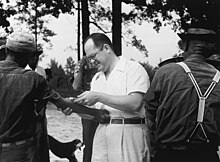
Numerous experiments which were performed on human test subjects in the United States in the past are now considered to have been unethical, because they were performed without the knowledge or informed consent of the test subjects.[1] Such tests have been performed throughout American history, but have become significantly less frequent with the advent and adoption of various safeguarding efforts.[1] Despite these safeguards, unethical experimentation involving human subjects is still occasionally uncovered.[2]
Past examples of unethical experiments include the exposure of humans to chemical and biological weapons (including infections with deadly or debilitating diseases), human radiation experiments, injections of toxic and radioactive chemicals, surgical experiments, interrogation and torture experiments, tests which involve mind-altering substances, and a wide variety of other experiments. Many of these tests are performed on children,[3] the sick, and mentally disabled individuals, often under the guise of "medical treatment". In many of the studies, a large portion of the subjects were poor, racial minorities, or prisoners.
Many of these experiments violated US law even at the time and were in some cases directly sponsored by government agencies or rogue elements thereof, including the Centers for Disease Control, the United States military, and the Central Intelligence Agency; and in other cases were sponsored by private corporations which were involved in military activities.[4][5][6] The human research programs were usually highly secretive and performed without the knowledge or authorization of Congress, and in many cases information about them was not released until many years after the studies had been performed.
The ethical, professional, and legal implications of this in the United States medical and scientific community were quite significant and led to many institutions and policies that attempted to ensure that future human subject research in the United States would be ethical and legal. Public outrage in the late 20th century over the discovery of government experiments on human subjects led to numerous congressional investigations and hearings, including the Church Committee and Rockefeller Commission, both of 1975, and the 1994 Advisory Committee on Human Radiation Experiments, among others.
- ^ a b Miteu, Goshen D. (May 2024). "Ethics in scientific research: a lens into its importance, history, and future". Annals of Medicine & Surgery. 86 (5): 2395–2398. doi:10.1097/MS9.0000000000001959. ISSN 2049-0801. PMC 11060189. PMID 38694399.
- ^ Meyerowitz-Katz, Gideon; Wieten, Sarah; Arellano, María de Jesús Medina; Yamey, Gavin (April 14, 2022). "Unethical studies of ivermectin for covid-19". BMJ. 377: o917. doi:10.1136/bmj.o917. ISSN 1756-1833. PMID 35422425.
- ^ Hornblum Allen M.; Newman Judith Lynn; Dober Gregory J. (2013). Against Their Will: The Secret History of Medical Experimentation on Children in Cold War America. Palgrave Macmillan. ISBN 978-0-230-34171-5.
- ^ Stobbe, Mike (February 27, 2011). "Ugly past of U.S. human experiments uncovered". NBC News. Archived from the original on March 2, 2013. Retrieved April 14, 2018.
- ^ Conahan, Frank (September 28, 1994). "Human Experimentation An Overview of Cold War Experimentation Programs" (PDF). United States General Accounting Office.
- ^ "Report on Search for Human Radiation Experiment Records" (PDF). U.S. Department of Defense. June 1997.